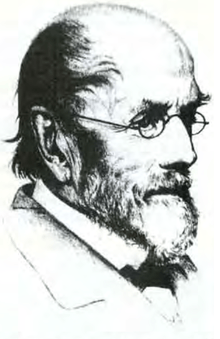Hensleigh Wedgwood
Hensleigh Wedgwood (21 January 1803 – 2 June 1891) was a British etymologist, philologist and barrister, author of A Dictionary of English Etymology. He was a cousin of Charles Darwin, whom his sister Emma married in 1839.[1]
Hensleigh Wedgwood | |
|---|---|
 | |
| Born | 21 January 1803 Tarrant Gunville, Dorset |
| Died | 2 June 1891 (aged 88) |
| Resting place | Stoke Minster (The Church of St. Peter ad Vincula) 53°00′15″N 02°10′53″W |
| Nationality | English |
| Alma mater | Christ's College, Cambridge |
| Occupation | Barrister, magistrate, Philologist |
| Known for | Writing on English Etymology |
| Spouse(s) |
|
| Children | six |
| Parent(s) |
|
| Relatives |
|
Early life
Wedgwood was born at Tarrant Gunville in Dorset, the fourth son of Josiah Wedgwood II and Elizabeth Allen of Cresselly, Pembrokeshire.[1]
He was educated at Rugby School, then entered St John's College, Cambridge in 1820 but switched to Christ's College the following year.[2] Though he did well in maths, graduating as 8th wrangler, he finished bottom in the classical tripos at Cambridge in 1824, for which he was awarded the first "wooden wedge", equivalent to the wooden spoon,[1] and jokingly named for him.[3]
Career
After leaving Cambridge, Wedgwood read for the chancery bar. In 1828, he qualified as a barrister, but never practised.[1] Between 1831 and 1837, he served as a police magistrate and sat at the Surrey magistrates' court at Union Hall, Southwark.
A notable case that came before him during his tenure was that of James Pratt and John Smith in 1835, whom he committed to trial after their arrest for homosexual acts. After their trial and conviction at the Central Criminal Court, the two became the last to be executed for sodomy in England. This was in spite of Wedgwood himself calling for a commutation of their death sentences in a letter to the Home Secretary.[4][5]
Wedgwood resigned from the magistracy after deciding that one of his duties, the administrations of oaths, was inconsistent with the commandments of the New Testament. Between 1838 and 1849, he held the post of Registrar of Metropolitan Public Carriage.[1]
His main fields of study were philology and etymology. His Dictionary of Etymology was published in 1857. He was a founding member of the Philological Society.[1]
Spiritualism
Wedgwood became interested in spiritualism and attended séances. In 1874, he attempted to get T.H. Huxley involved in spiritualism by sending him an alleged spirit photograph. Huxley was not impressed and suggested the photograph had been produced fraudulently by the use of a second image placed on the plate inside the camera. Hensleigh refused to believe this explanation and considered the photograph to be genuine.[6]
Wedgwood was a member of the British National Association of Spiritualists and a vice-president of the Society for Psychical Research.[7]
Personal life
He married Frances Emma Elizabeth "Fanny" Mackintosh (1800–1889) in 1832, his first cousin, the daughter of Sir James Mackintosh and his second wife Catherine "Kitty" Allen.[1] They had six children:
- Frances Julia Wedgwood (1833–1913), feminist philosopher and writer known as "Snow".
- James Mackintosh Wedgwood (1834–1874)
- Ernest Hensleigh Wedgwood (1837–1898)
- Katherine Euphemia Wedgwood (1839–1934), married Thomas Farrer, 1st Baron Farrer.
- Alfred Allen Wedgwood (1842–1892), father of J. I. Wedgwood.
- Hope Elizabeth (1844–1935) married her cousin Godfrey Wedgwood.
Wedgwood died on 2 June 1891 at his house at 94 Gower Street, London.[1] He was buried at the Church of St. Peter ad Vincula, Stoke on Trent, now known as Stoke Minster. His funeral on 4 June 1891 was noted in his sister's diary. [8]
Legacy
A collection of around 550 books from his library is held by the library of the University of Birmingham. They were donated to the university by his daughter, Frances Julia Wedgwood.[9]
Partial list of works
- The Principles of Geometrical Demonstration, 1844
- On the Development of Understanding, 1848.
- On the Origin of Language, 1866.
- A Dictionary of English Etymology, Second Edition, 1872.
- Contested Etymologies in the Dictionary of Rev. W. W. Skeat, 1882.
See also
References
- Herford, C.H.; Rev. John D. Haigh (2004). "Wedgwood, Hensleigh (1803–1891)". Oxford Dictionary of National Biography. Oxford University Press. Retrieved 9 May 2010.
- "Wedgewood (or Wedgwood), Hensleigh (WGWT820H)". A Cambridge Alumni Database. University of Cambridge.
- Bristed, Charles Astor (1852). Five years in an English university. G.P. Putnam. p. 253.
- Cocks (2010) p.38
- Upchurch (2009), p. 112.
- Browne, E. Janet. (2003). Charles Darwin: The Power of Place, Volume 2. Princeton University Press. p. 404. ISBN 978-0691114392
- Oppenheim, Janet. (1988). The Other World: Spiritualism and Psychical Research in England, 1850-1914. Cambridge University Press. p. 138. ISBN 978-0521347679
- http://darwin-online.org.uk/content/frameset?itemID=CUL-DAR242%5B.55%5D&viewtype=image&pageseq=1
- "The Hensleigh Wedgwood collection". University of Birmingham. Retrieved 31 May 2014.
Bibliography
- Cocks, H.G. (2010). Nameless Offences, Homosexual Desire in the 19th Century. Bloomsbury Academic. ISBN 9781848850903.
- Upchurch, Charles (2009). Before Wilde: Sex between Men in Britain's Age of Reform. University of California Press. ISBN 0520258533.
External links
- Hensleigh Wedgwood profile, darwin.lib.cam.ac.uk
- Hensleigh Wedgwood and The Wooden Spoon @ Ward's Book of Days, wardsbookofdays.com